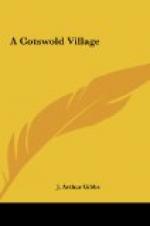In addition to the wonders of the heaven there are many other interesting features connected with a drive or walk by the light of the stars or the moon. A Cotswold village seen by moonlight is even more picturesque than it is by day. The old, gabled manor houses are a delightful picture on a cold, frosty night in winter; if most of the rooms are lit up, they give one the idea of endless hospitality and cheerfulness when viewed from without. To walk by a stream such as the Coln on such a night is for the time like being in fairyland. Every eddy and ripple is transformed into a crystal stream, sparkling with a thousand diamonds. The sound of the waters as they gurgle and bubble over the stones on the shallows seems for all the world like children’s voices plaintively repeating over and over again the old strain:
“I chatter, chatter
as I flow
To join the brimming
river,
For men may come and
men may go,
But I go on for ever.”
Now is the time to discover the haunts of wild duck and other shy birds like the teal and the heron. In frosty weather many of these visitors come and go without our being any the wiser, unless we are out at night. Before sunrise they will be far, far away, and will probably never return any more. Time after time we have been startled by a flight of duck rising abruptly from the stream, in places where by day one would never dream of looking for them. Foxes, too, may be seen within a stone’s throw of the house on a moonlight evening. They love to prowl around on the chance of a dainty morsel, such as a fat duck or a semi-domestic moorhen. Nor will they take any notice of you at such a time.
I made a midnight expedition once last hunting season to see that the “earths” were properly stopped in some small coverts situated on a bleak and lonely spot on the Cotswold Hills. On the way I had to pass close to a large barrow. Weird indeed looked the old time-worn stone that has stood for thousands of years at the end of this old burial mound. A small wood close by rejoices in the name of “Deadman’s Acre.” The moon was casting a ghastly light over the great moss-grown stone and the deserted wolds. The words of Ossian rose to my lips as I wondered what manner of men lay buried here. “We shall pass away like a dream. Our tombs will be lost on the heath. The hunter shall not know the place of our rest. Give us the song of other years. Let the night pass away on the sound, and morning return with joy.” Then, as the rustling wind spoke in the lifeless leaves of the beeches, the plain seemed to be peopled with strange phantasies—the ghosts of the heroes of old. And a voice came back to me on the whispering breeze:




